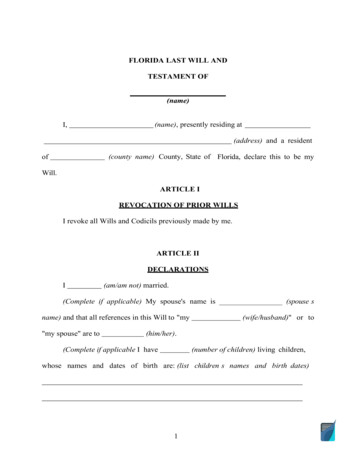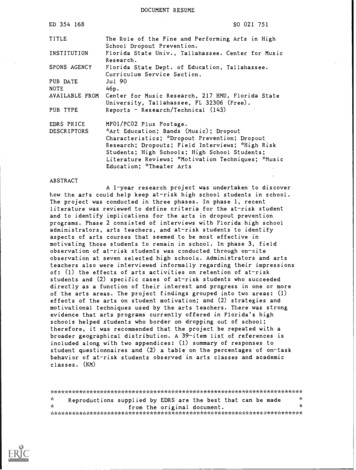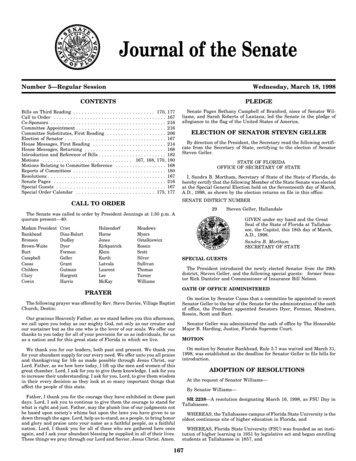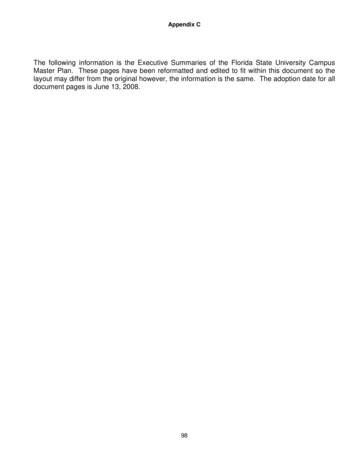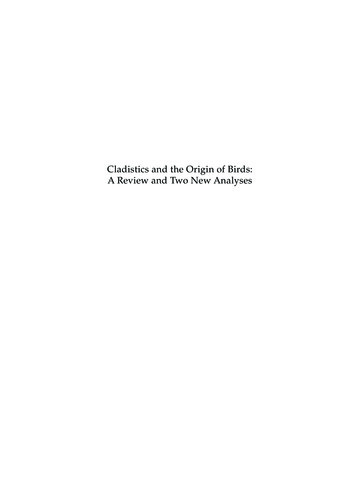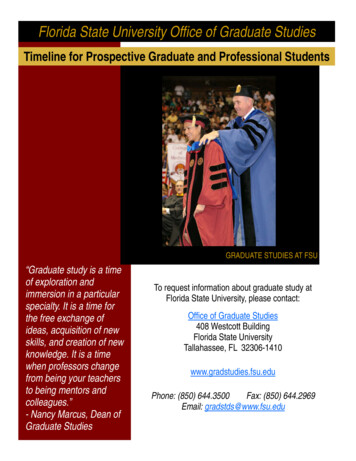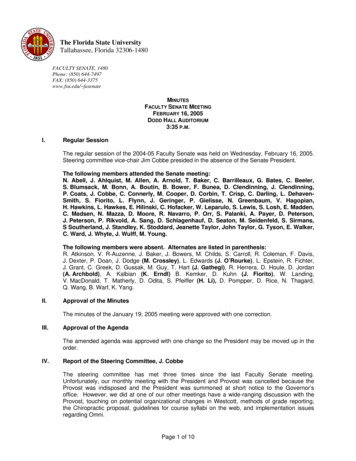
Transcription
The Florida State UniversityTallahassee, Florida 32306-1480FACULTY SENATE, 1480Phone: (850) 644-7497FAX: (850) 644-3375www.fsu.edu/ fasenateMINUTESFACULTY SENATE MEETINGFEBRUARY 16, 2005DODD HALL AUDITORIUM3:35 P.M.I.Regular SessionThe regular session of the 2004-05 Faculty Senate was held on Wednesday, February 16, 2005.Steering committee vice-chair Jim Cobbe presided in the absence of the Senate President.The following members attended the Senate meeting:N. Abell, J. Ahlquist, M. Allen, A. Arnold, T. Baker, C. Barrilleaux, G. Bates, C. Beeler,S. Blumsack, M. Bonn, A. Boutin, B. Bower, F. Bunea, D. Clendinning, J. Clendinning,P. Coats, J. Cobbe, C. Connerly, M. Cooper, D. Corbin, T. Crisp, C. Darling, L. DehavenSmith, S. Fiorito, L. Flynn, J. Geringer, P. Gielisse, N. Greenbaum, V. Hagopian,H. Hawkins, L. Hawkes, E. Hilinski, C. Hofacker, W. Leparulo, S. Lewis, S. Losh, E. Madden,C. Madsen, N. Mazza, D. Moore, R. Navarro, P. Orr, S. Palanki, A. Payer, D. Peterson,J. Peterson, P. Rikvold, A. Sang, D. Schlagenhauf, D. Seaton, M. Seidenfeld, S. Sirmans,S Southerland, J. Standley, K. Stoddard, Jeanette Taylor, John Taylor, G. Tyson, E. Walker,C. Ward, J. Whyte, J. Wulff, M. Young.The following members were absent. Alternates are listed in parenthesis:R. Atkinson, V. R-Auzenne, J. Baker, J. Bowers, M. Childs, S. Carroll, R. Coleman, F. Davis,J. Dexter, P. Doan, J. Dodge (M. Crossley), L. Edwards (J. O’Rourke), L. Epstein, R. Fichter,J. Grant, C. Greek, D. Gussak, M. Guy, T. Hart (J. Gathegi), R. Herrera, D. Houle, D. Jordan(A. Archbold), A. Kalbian (K. Erndl) B. Kemker, D. Kuhn (J. Fiorito), W. Landing,V. MacDonald, T. Matherly, D. Odita, S. Pfeiffer (H. Li), D. Pompper, D. Rice, N. Thagard,Q. Wang, B. Warf, K. Yang.II.Approval of the MinutesThe minutes of the January 19, 2005 meeting were approved with one correction.III.Approval of the AgendaThe amended agenda was approved with one change so the President may be moved up in theorder.IV.Report of the Steering Committee, J. CobbeThe steering committee has met three times since the last Faculty Senate meeting.Unfortunately, our monthly meeting with the President and Provost was cancelled because theProvost was indisposed and the President was summoned at short notice to the Governor’soffice. However, we did at one of our other meetings have a wide-ranging discussion with theProvost, touching on potential organizational changes in Westcott, methods of grade reporting,the Chiropractic proposal, guidelines for course syllabi on the web, and implementation issuesregarding Omni.Page 1 of 10
Faculty Senate MinutesFebruary 16, 2005We met with Dean of Undergraduate Studies Karen Laughlin and Dean of the Faculties AnneRowe to discuss the revision of the faculty handbook, which is progressing. It was agreed thatthe various draft chapters would be given to the steering committee for comment as the draftswere completed, rather than waiting for the entire text to be drafted. We also discussed finalexamination policy with them, and suggested that they should collect data on what actual practicewas regarding final examinations in undergraduate courses before exploring possible changes inUniversity policy.Regarding the Chiropractic proposal, the steering committee wishes to commend the GPC andparticularly its Chair, George Bates, for the manner with which it dealt with this controversialproposal, which we believe reflected very well on the continued strength of faculty governance atFlorida State University.We met with Vice President Lee Hinkle for a presentation and discussion on the proposed revisedUniversity logo and the new branding initiative. We have invited her to make a brief presentationon these initiatives to the March 16 Senate meeting.We had a long and very wide-ranging discussion with Ike Eberstein, who we were inviting to chairthe proposed task force on issues concerning non-tenure track faculty. Ike has not yet agreed toserve as chair, but we are going to request data from the administration and explore theappropriate detailed terms of reference for this proposed task force with him again later in theyear. The steering committee would welcome suggestions as to what issues concerning nontenure track faculty the task force should address.We were told that collective bargaining with the UFF is, in the administration’s view, progressingwell, and the administration expects that only one or two more meetings will take place.The representatives you authorized to meet as a conference committee with representatives ofthe Student Senate to resolve differences over the proposed new Academic Honor Code held twomeetings with the students, and at the second we were able to resolve the remaining differences.You will recall that the Senate approved the new code back in the Fall. The only changes to whatyou agreed then in this compromise text to which the student representatives agreed are (a) theXF is omitted as a possible penalty less severe than suspension, and (b) the wording of themultiple submission clause is revised. The steering committee believes that from a faculty pointof view these two changes are of no substantive importance, and urges that the Senate approvethe revised proposed new code. Therefore, on behalf of the steering committee, I now so move.The motion passed unanimously.V.Reports of Standing Committeesa.Undergraduate Policy Committee, S. LewisSenators should be aware that the requirements for the Computer Skills Competencywere changed as a result of the SACS review last year. This change occurredimmediately after the UPC had increased the standards used to measure students’acquisition of computer skills appropriate to their majors. As a result of these two events,all undergraduate programs must identify the computer skills competencies needed bytheir graduates and the courses in which these skills are measured. All coursespreviously approved for the Computer Skills Competency designation have been askedto provide evidence that they include a capstone activity that is used to measure theacquisition of specific competencies and that evaluation is guided by a well-definedrubric.Page 2 of 10
February 16, 2005Faculty Senate MinutesSo, the Computer Skills Competency Sub-Committee of the UPC has been, and will be,busy approving courses in this area for a while. On behalf of the Undergraduate PolicyCommittee, I would like to inform the Senate that the following courses have beenapproved for the Computer Skills Competency designation:CGS 2060CGS 2065CGS 2100NUR 3167DAN 4418Computer Literacy IComputer Literacy IIMicroapplications for Business and EconomicsThe Research Process for Professional PracticeSurvey of Dance TechnologiesThank you.b.Graduate Policy Committee, G. BatesThe GPC has been quite busy this year. We met seven times in the fall and haveapproved 3 new masters programs, one in science teaching, one is biostatistics and onein aquatic sciences. We also conducted 5 program reviews all in the College ofEngineering and all were approved to continue. We met in January to discus theChiropractic program and we will also be doing 6 program reviews this spring. One of themain things the policy committee does is to approve new program proposals and toreview existing programs. I would like to take a moment to thank the people who conductthese reviews:James BrooksPeter McClarenRalph DoughertyEmily HaymesSrinivas PalankiJohn SobanjoChristopher TamChuck ZhangRaj AroraJay BakerJoe DonoghueFlip FroelichJim ZhengJack QuineElizabeth PlattPam PerrewePeter KaluSanford SafronPeggy HsiehDianne SpeakeBill CloonanBarry FaulkNancy MarcusJohn GeringerSissy CarrolWinnifred AdolphLois HawkesDavid LevensonDan VitkusSanta AriasDavid HouleTricia YoungMark PietralungaDennis MooreDan Maier-KatkinLee StepinaBarney TwissJoyce CarbonellWalter TschinkelMary Karen DahlDavid KirbyRalph BerryHoward BaerThese people have spent a great deal of their time conducting these reviews and we allowe them our thanks.I wanted to give you an overview of what went on in regards to the Chiropractic program.I will set the stage by telling you how programs are approved. Ordinarily programs areinitiated by the faculty then they are discussed within the appropriate department andcollege and then are sent forth to the administration. When it reaches the administrationit is also simultaneously given to the GPC to review. The approval is a 2 step process.Page 3 of 10
Faculty Senate MinutesFebruary 16, 2005First the program is given approval to explore a new program. Then they go back andflesh out the program and then they come back a second time for final approval. I wasnotified in November that we were going to need to review this and the time was not longenough to do a two step review. The proposal was not given to us until early/midDecember so I arranged for meeting in the earliest part of January. At the same time theSteering Committee thought it was good idea to hold an open faculty forum.We met on January 10 and discussed the Chiropractic Program. We voted to assert ourright to have time to review it. We passed a motion directing the BOT not to approve theprogram until the GPC had time to study it. The BOT passed a similar motion directed atthe BOG. The BOG killed the program. A very positive outcome of the eventssurrounding the Chiropractic program was that the University administration and the BOTexplicitly acknowledged the faculty’s role in the approval of new programs and that theGPC is the final faculty body that approves new graduate and professional programs.c.Teaching Evaluation Committee, E. WalkerThis is our annual information report (See Addendum 1). We currently have 2 seats thatare unfilled so if you have colleagues that are chomping at the bit, please forward thosenames to me.We received a report recently from the chair of the Science area which enumerated fromhis sample of a number of reports in his department. He thought there was adistressingly high number of problems.I wanted to remind you that part of the original motion implementing the SPOT systemwas a principle that teaching evaluation should be done well and would be solely basedon course evaluation data. We are now poised to move the focus off of SPOT forms etc.to more substantive conversation about other initiatives to supplement that informationwith other means of teaching evaluation.d.Liberal Studies Coordinating Committee, D. JohnsonThere were two charges given to the Liberal Studies Committee. One was a total liberalstudies review and the other was the FIGS program. The later was given the green lightand the former was sent back for revision and reconceptualization. We decided toshepherd the FIGS program through its first year before reconsidering the issue of FSUliberal studies offering.I would like to thank on behalf of the committee, Dean Karen Laughlin’s office for doing atremendous job in setting all this up. This is a list of all the things that are taking place.(See Addendum 2.)In addition to FIGS the committee is currently developing an evaluation instrument beforethe FIGS program even gets off the ground so we can evaluate things like who signs upfor the program and how successful it is.VI.Special Order, Office of National Fellowships, J. SpoonerThank you for having me here today to share with you about the Office of National Fellowships.This is the last stop on a month long tour of meeting with different groups around campus. I amglad to have the faculty be the last group because you are very near and dear to my heart andare the most important group in terms of servicing our students.When I interviewed for this job one of the words I kept pounding over and over again to thedifferent committees I was talking to was the need to facilitate the different resources on anyPage 4 of 10
February 16, 2005Faculty Senate Minutescampus to help our students to be successful. I come to FSU from Chipola College where I wasa faculty member in the English department and worked with the honors program and nationalscholarships. One of the reasons we were successful is that we and the ability to combineresources together all for the benefit of being advocates for our students. We have some of themost outstanding students in the world. My job is to let the rest of the world realize that that is apossibility. One of the most important things we do in this office is to promote. We promote thekinds of opportunities that are available for our students, in particularly undergraduates. We areworking very hard with faculty, administration, advisors to raise the profile of the possibility ofstudents applying to national fellowships. The most enjoyable part of my job is the mentoring andtutoring as well as the teaching of students. I left a tenured position to take this job and the onlyreason I did that is that I realized that teaching really continues when you work with students inthe application process. The one on one collaboration that takes place between students andfaculty in this process is very important. I am looking forward to working with you. While ouroffice will provide students with resources, faculty become instrumental in helping studentssucceed. Once our students gain this kind of national recognition, we want not only everystudent, faculty and staff member to know about their achievements, we want the whole world toknow.VII.Old BusinessThere were no items of old business.VIII.New BusinessThere were no items of new business.IX.University Welfarea.Omicron Delta Kappa, A. LeysiefferI am the advisor and faculty secretary to Omicron Delta Kappa which has been on FSU’scampus since 1950. I am here to represent this very prestigious organization. ODK is anational leadership honor society for men and women. It was founded in 1914 atWashington and Lee to recognize and encourage superior scholarship and leadership bymen and women of exemplary character. Membership in ODK is by invitation only and isa mark of highest distinction and honor.Where students apply, the faculty,administrators and staff have to be nominated by their peers. I want to recognize threewho are being invited: Valliere Richard Auzenne, Anne Rowe and Kirby Kemper.b.Updates on Bargaining and Related Matters, J. FioritoOn January 7th 2003, despite the legal clarity of the well-established successorshipdoctrine, every one of Florida’s eleven newly autonomous Boards of Trustees assertedthat faculty no longer enjoyed UFF representation or the contractual protection of acollective bargaining agreement. Florida law and the successorship doctrine emphasizeemployee choice in employee representation. Yet the Trustees took it upon themselvesto decide this matter for employees, including faculty. Based on that presumptuousarrogance, but probably at the direction of others, university administrations acted outtheir bits in the statewide attack on faculty representation.At FSU, faculty members were told they could not discuss union representation in theiroffices or via e-mail, even though faculty offices and university e-mail are forums fornearly every other imaginable topic. Payroll dues deduction for UFF members washalted, despite clear authorizations signed by individual faculty members that had not, buteasily could have been rescinded. The FSU administration refused to meet with UFFFSU chapter leaders despite long-standing consultation arrangements, and refused toPage 5 of 10
Faculty Senate MinutesFebruary 16, 2005process grievances of individual faculty members attempting to exercise their contractualrights to defend themselves from injustice.UFF legal counsel advised FSU and UFF members that this was clearly contrary to law,but we knew that asserting and defending faculty rights would take time. Rather thanwait for eventual justice, UFF planned a statewide organizing campaign to demonstratethat faculty did indeed want UFF representation. Two years ago, I expressed to this bodysome resentment at having to spend time and resources, mine, that of hundreds of otherFSU faculty, and thousands statewide, to defend well-established faculty rights. I did sayI’d get over it.My recovery was helped along greatly by the overwhelming support for UFFrepresentation expressed by over 1100 faculty members at FSU and over 6500 statewidewho during the fall of 2002 signed authorization cards stating they wanted UFFrepresentation. It was helped along further by the overwhelming representation electionvictories in the fall of 2003, where FSU faculty voted 736 to 33 for UFF. Still, legalvindication had to wait until this past Monday, when an appellate court decisionunanimously reversed a split decision of the Public Employees Relations Commission(PERC) that supported the BOT anti-faculty position. The court said:“PERC’s ruling that [Trustees] were not successor employers waserror. A rule allowing state government to alter terms and conditions ofemployment unilaterally based solely on reshuffling in the higher reachesof the bureaucracy [is contrary to the Florida constitution and statutes]”The practical and remedial implications of this ruling are still being worked out, but theruling is an unquestionable and extremely significant win for faculty rights. Much workremains to be done.Hundreds of FSU faculty have joined UFF. They recognize that defending faculty rightscan be expensive, and that it is neither wise nor ethical to expect others to assume thatburden. We’re hopeful that the new FSU collective bargaining agreement will showgenuine respect for FSU faculty and seriously addresses faculty concerns, includingsalary problems.We’re not there yet, but we are getting close. Through our most recent bargainingsession last Friday, we’ve reached tentative agreement on 24 of the 32 articles that weexpect to comprise the new contract. Four of the eight unresolved articles are part of the“minimal changes formula” I mentioned at previous Senate meetings, and should beresolved fairly quickly. In three other unresolved articles, we’ve narrowed our differencesto a fairly small range of issues. And then there’s salary.Our UFF-FSU faculty team presented a comprehensive salary proposal last June. It wascarefully designed to address serious salary problems that FSU faculty face everydayand that take a deadly toll on faculty morale. The administration team presented acounteroffer in October, but in our faculty team’s view, we have yet to receive a seriousproposal. We expect a discussion that shows respect for faculty concerns and producesa systematic plan to address them.As we seem to be on the verge of agreement on nearly all non-salary issues, seriousdiscussions on salary should begin very soon. FSU faculty are among the most talentedand hardworking in the state, indeed, in the nation and the world, and deserve salariesthat reflect their contributions. I hope you will support UFF and our faculty bargainingteam in this conviction, and urge your faculty colleagues to do the same.I thank Vice-President Cobbe and other Senators for their time, and I will be glad to takeany questions or comments if time permits. I’d also like to point out that details of bothPage 6 of 10
February 16, 2005Faculty Senate Minutesteams’ salary proposals and overall bargaining progress, the recent appellate courtruling, and bargaining settlements at other state universities are available at the UFFFSU Chapter web site, www.uff-fsu.org.X.Announcements by Deans and other administrative officersa.Dean of the Faculties, A. RoweI want to reiterate what Jack said concerning bargaining—that we are working toward anagreement. We have worked very well. I have a brief response to what Jack said aboutthe First District Court of Appeals and this is just to elaborate just slightly. On February14 the First District Court of Appeals did reverse the order of the Florida Public EmployeeRelations Committee and remanded the matter back to the commission for furtherproceedings consistent with the courts opinion. I do want to comment though that thecourt did not find that Florida State University had committed an unfair labor practice andwe think that this decision is not expected to delay current negotiations between the UFFand Florida State University. We will be meeting on Friday of this week and again nextweek.b.Senior Vice President of Finance and Administration, J. CarnaghiOn Friday we will be issuing our fourth payroll from the new OMNI system. According tothe numbers I have seen, it is beginning to resemble the system we were using prior tothe new system. Things are beginning to settle down. While this is promising, it is not tosuggest we have solved all our problems, rather we are moving in the right direction. I’dlike to give you a status report on 3 items that seem to be surfacing more than others.One is the tax withholding matter, second appointments of OPS staff and third travelreimbursements.First, tax withholdings have both a long term and a short term answer to it. On the longterm, we are exploring options and discussing matters with technical operating staffs atGeorgia Tech, Princeton, Utah and Southern Methodist who have similar contractingissues. When we have enough information we will assemble a small group of facultymembers and deans and we will work together to agree upon a fix for our underwithholdings. We must find a solution that fits the majority of faculty tax issues. Thereare 3 axioms that we must abide by; one is that it has got to be legal, second we can’tviolate the warrantees with the PeopleSoft system and third we must be able to afford thechanges that we make. I am confident that we will be successful. What do we do in theshort run? If you have a comfort level with your computer and your employee self guidethat you should have in your department, the section marked e-pay, page 5, you can goin and you can change your taxes. If you are uncomfortable with that, I will give you aname and a phone number. They will come out to you armed with what you were payingin taxes bi-weekly before the new system. We will walk you through and help you makethe change. Call Sue Andres at 644-5052.Second is the hiring of OPS employees. Beginning next week, HRS staff will beginvisiting colleges and departments to get feedback on a design called OMNI Express.This used to be a simple process and now takes hours. We think we have redesignedsomething to help and we need input. I think you will see some marked improvements.Third, travel reimbursements going to savings accounts instead of regular checkingaccounts. We don’t really know why it’s happening but we are sending the checks andbanks seem to handle it well. Credit unions are struggling. We are giving the institutionsthe codes they are to use and someone is putting it in one account as apposed to theother. If people are having problems, call the institution and it should be fixed. If you arenot getting that response from your institution, call Bill Agner at 645-1815.Page 7 of 10
Faculty Senate MinutesXI.February 16, 2005Announcements by the ProvostProvost Abele was unable to attend today’s meeting.XII.Announcements by the PresidentThe Provost has had gall bladder surgery and is doing well.Most of you have read about the governor’s budget recommendations. I don’t recall in my time inhigher education where I have seen a worse budget notwithstanding when the state was in somekind of economic crisis. The Board of Governors (BOG) recommended about 80 million ofgeneral revenue for undergraduate enhancement. The governor picked up 20 million which isunacceptable. They recommended a change in the major gifts program which basically caps theamount of a major gift but the most egregious part is that if it is not matched in a given year thenthe legislature has no obligation to match it there after. If people know that their gift is going to bematched then they will wait sometimes 3 or 4 years. More importantly is that the governor hasmoved the state university system out of the administrative funds program. That says when theysay that state employees get a % raise, that does not apply to the university system. We will getabout 2 million of that 20 million and a 1% pay raise is about 2 million. You have balancedyour budget on students and tuition and they are recommending a 7% tuition increase. They arenot recommending any of the flexibility issues, the Garnet and Gold guarantee, that FSU and UFhave asked for. They did provide funding for the health insurance premiums for the employee butnot for dependents. It is a pretty bad package. But it is the governor’s budget and the legislaturecan choose what it wants to do. We have asked that the BOG at least defend their budget butthey have chosen to defend the governor’s budget. It’s not a good picture going into a sessionparticularly when we are faced with a 2 billion spending windfall of revenue from the hurricanes.The bad news is that they were devastating; the good news is that there has been a lot ofconstruction revenue. One of the most egregious parts of that has been the fight with theChiropractic deal which you realize is pretty much over. We were told that no matter howwhatever body voted that there would be no retribution. We went to Gainesville and everyonevoted their conscience. Twenty minutes later they brought the governors PECO request whichhad our Biology Building and the Panama City Building and the PO&M funding. 14 million wascut and redistributed. The only university that took a cut was FSU. I don’t think there was any tieto the Chiropractic issue so they tell me. They have a series of guidelines they go by which saysfund the buildings that are under construction first and build them out i.e. Biology and PanamaCity, then put new dollars up for the new buildings based on the priority of that building usingacademic buildings first. So they take 14 million first which means we can’t complete them andgive it other universities to plan new buildings. So they have violated their own principles. Thenwe come back to Tallahassee and there were people saying that since we didn’t do theChiropractic School we are going to take our money back. If you remember we already paid forthat once since last year the governor vetoed about 18 million of projects and said we could takeit from the 9 million. I don’t believe we will lose the 9 million this year which has beencommitted to the classroom building. We will probably resubmit to them a priority of those dollarsbased on Chiropractic not being here and the possibility of a alternative medicine researchcenter. We also have a commitment from the state to give us the Gunter Building which is full ofasbestos. We believe some that 9 million could be used to clean it up. There are some otherprojects on campus that we could finish up with the 9 million.Tied directly to this is the relationship of the universities and the Boards of Trustees to the BOGand the lawsuit that was filled. One of the reasons we were being hard headed aboutChiropractic was that we wanted it off the table so that when the lawsuit came to the courts it wasresolved whichever way. We did not want the coffin on our doorstep. We were somewhatsuccessful in that. The problem is that when we get into that lawsuit there are things that havesignificant impacts on universities. First there is a provision if the BOG prevails that they wouldhave jurisdictions over all DFO’s. So that means the Foundation, Boosters, etc would have to gothe BOG with a spending plan. They could say that if you want to build a classroom building andPage 8 of 10
February 16, 2005Faculty Senate Minutesyou don’t put up half the money from your foundation we aren’t going to put up PECO money.That is a very dangerous place to put universities.If you recall when I first got there we had some challenges with the economy and the money notbeing there. The Presidents Council came together and we went out and we did emails andeditorial tours. We had a plan to influence the outcome. With the exception of FSU and UFeveryone just backed of and sat on the sidelines. I am hopeful that we can prevail on some ofour colleagues to be a little more active. UCF has begun to figure it out since they are dependenton E&G and enrollment dollars.Anne Rowe is still working on the collective bargaining issue. We hope to have that soon. I thinkthey are down to 3 or 4 issues.We are also going to the city about the master plan. They have decided to go into that masterplan and build the Symphony Project across from the music building. We are in the process ofprotesting that. We are not against the project or some kind private program there but this is a 10story facility and takes up every square inch of the property. On the bottom floor they areproposing some kind of commercial development such as restaurant. Our issue is what thecommercial space is and what they are going to do with it. They will be condo’s which will startabout 300,000. We have tried to explain that this doesn’t make a lot of sense. In order to getthe master plan approved, we paid the city about 2 million with the understanding that therewould be some sort of FSU facility. There is a second phase of the Symphony Project that is arental property maybe for graduate students.We need to rethink the bus service and clean up the buses and make them look better for thestudents who are riding them. We need to recognize alumni village, the MAG lab and the newfraternity house are on Ocala. We need to rethink the bus systems in terms of FSU.We will probably bring the Civic Center an offer in the next few weeks. The city will have tobecome partner in that, more so than they would like or we will wind up in litigation with thedeveloper.If you haven’t been to Seven Days of Opening Nights, I hope will do so. Most of the shows havesold out and people seem to be accepting the programming very well. The PRISM concert lastnight was outstanding.We have 2 dean searches going on now. Music is down to the final 5 and they are bringi
The Florida State University Tallahassee, Florida 32306-1480 FACULTY SENATE, 1480 Phone: (850) 644-7497 . all undergraduate programs must identify the computer skills competencies needed by . approved 3 new masters programs, one in science teaching, one is biostatistics and one



